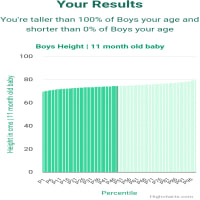Boys Height chart in cms for babies 11 month old baby

General Summary: 11 month old baby boys height
In most cases, height measurements for 11 month old baby boys will be in the range between 69 and 77 cms. The average height for 11 month old baby boys is 74 cms, according to the CDC and anonymized data from users.
All Results
Enter your height measurements above to see how they compare
So far, we have recorded 0 height measurements for 11-month-old-baby boys on LifeMeasure!
(chart updates daily)
See more ages